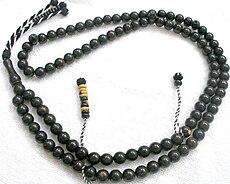Salawat
This article has multiple issues. Please help or discuss these issues on the talk page. (Learn how and when to remove these template messages)
|
| Part of a series on |
| Muhammad |
|---|
 |
|
Salawat (Arabic: صَلَوَات, ṣalawāt sg. salat; also referred to as divine blessings on Muhammad, durood shareef or durood-e-Ibrahim) is an Islamic complimentary Arabic phrase, which contains the salutation upon Muhammad. This phrase is usually expressed by the Muslims as part of their five times daily prayers (usually during the tashahhud) and also when Muhammad's name is mentioned.[1][2]
Salawat is a plural form of salat (Arabic: صَلَاة) and from the triliteral root of ṣ-l-w the letters "ṣād-lām-wāw" (ص ل و) which means "prayer" or "salutation".[3]
Arabic philologists hold the view that the meaning of the word salawat would vary according to who has used the word, and to whom it is used for.[4]
Quran[]
Quran 33:56 states:
إِنَّ ٱللَّهَ وَمَلَـٰٓٮِٕڪَتَهُ ۥ يُصَلُّونَ عَلَى ٱلنَّبِىِّۚ يَـٰٓأَيُّہَا ٱلَّذِينَ ءَامَنُواْ صَلُّواْ عَلَيۡهِ وَسَلِّمُواْ تَسۡلِيمًا
"Truly God and His angels invoke blessings upon the Prophet. O you who believe! Invoke blessings upon him, and greetings of peace!"..[5]
In Islamic context[]
"When Muhammad sends Salawat upon the believers, it indicates his prayer for their welfare, blessing and salvation."[6]
In Islam, when a Muslim or Islamic angels (malā'ikah) recite salawat, it means they are sending it to the prophet and are showing Allah their respect for Muhammad, while when the same is sending upon prophet by Allah himself, it means he is blessed by Allah.[1]
- Muhammad was also reported saying: "The meanest person is he who does not invoke Salawat upon me when my name is mentioned in his presence."[7][8]

- Ibn Asakri has transmitted from al-Hasan bin Ali that Muhammad said: "Invoke more Salawat upon me, for your invocation is conducive to your sins being forgiven. And pray for me a high status and intercession, for surely my intercession will plead in your favour before Allah."[9]
- There was a narration from Ja'far al-Sadiq from Muhammad. He said: "All supplications to Allah will remain in a veil from the sky until a Salawat is sent to Mohammad PBUH and his Household."[10]
- In another tradition, Ja'far al-Sadiq was quoted that: "Whoever sends Salawat on the Prophet PBH and his Household means 'I am standing on the promise that I gave when Allah asked me, 'Am I not your lord? And I answered yes you are.'"[11]
Recommended Salawat[]
According to various reports,[12] the following Salawat are recommended by Muhammad:
ʾAllāhumma ṣalli ʿalā Muḥammadin wa ʿalā ʾāli Muḥammadin kamā ṣallayta ʿalā ʾIbrāhīma wa ʿalā ʾāli ʾIbrāhīma ʾinnaka Ḥamīdun Majīdun ʾAllāhumma bārik ʿalā Muḥammadin wa ʿalā ʾāli Muḥammadin kamā bārakta ʿalā ʾIbrāhīma wa ʿalā ʾāli ʾIbrāhīma ʾinnaka Ḥamīdun Majīdun
ٱللَّٰهُمَّ صَلِّ عَلَىٰ مُحَمَّدٍ وَعَلَىٰ آلِ مُحَمَّدٍ كَمَا صَلَّيْتَ عَلَىٰ إِبْرَاهِيمَ وَعَلَىٰ آلِ إِبْرَاهِيمَ إِنَّكَ حَمِيدٌ مَجِيدٌ ٱللَّٰهُمَّ بَارِكْ عَلَىٰ مُحَمَّدٍ وَعَلَىٰ آلِ مُحَمَّدٍ كَمَا بَارَكْتَ عَلَىٰ إِبْرَاهِيمَ وَعَلَىٰ آلِ إِبْرَاهِيمَ إِنَّكَ حَمِيدٌ مَجِيدٌ |
Allah, sanctify Muhammad and the family of Muhammad, as you have sanctified Ibrahim and the family of Ibrahim. Truly, You are Praiseworthy and Glorious. Allah, bless Muhammad and the family of Muhammad, as you have blessed Ibrahim and the family of Ibrahim. Truly, You are Praiseworthy and Glorious.[13] |
Muhammad was also reported to have said: "Do not invoke incomplete salawat upon me". His Sahabah asked him: "What is incomplete salawat?" He replied them: "When you say: 'O Allah, send blessing to Muhammad' and then stop on that. Rather say: ٱللَّٰهُمَّ صَلِّ عَلَىٰ مُحَمَّدٍ وَعَلَىٰ آلِ مُحَمَّدٍ 'O Allah! send Your blessing to Muhammad and the progeny of Muhammad."[14]
Variants of Salawat[]
There are several variant phrases of Salawat that may be used. The most common phrases are:
| Arabic | Transliteration IPA |
Phrase |
|---|---|---|
| ٱللَّٰهُمَّ صَلِّ عَلَىٰ مُحَمَّدٍ وَآلِ مُحَمَّدٍ | ʾallāhumma ṣalli ʿalā muḥammadin wa-ʾāli muḥammadin /ʔaɫ.ɫaː.hum.ma sˤal.li ʕa.laː mu.ħam.ma.din wa.ʔaː.li mu.ħam.ma.din/ |
O God, send blessings upon Muhammad and the Progeny of Muhammad. |
| ٱللَّٰهُمَّ صَلِّ عَلَىٰ مُحَمَّدٍ وَعَلىٰ آلِ مُحَمَّدٍ | ʾallāhumma ṣalli ʿalā muḥammadin wa-ʾalā ʾāli muḥammadin /ʔaɫ.ɫaː.hum.ma sˤal.li ʕa.laː mu.ħam.ma.din wa.ʕa.laː ʔaː.li mu.ħam.ma.din/ |
O God, send blessings upon Muhammad and upon the Progeny of Muhammad. |
| ٱللَّٰهُمَّ صَلِّ وَسَلِّمْ عَلَىٰ مُحَمَّدٍ وَعَلىٰ آلِ مُحَمَّدٍ | ʾallāhumma ṣalli wa-sallim ʿalā muḥammadin wa-ʾalā ʾāli muḥammadin /ʔaɫ.ɫaː.hum.ma sˤal.li wa.sal.lim ʕa.laː mu.ħam.ma.din wa.ʕa.laː ʔaː.li mu.ħam.ma.din/ |
O God, send blessings and peace upon Muhammad and upon the Progeny of Muhammad. |
| ٱللَّٰهُمَّ صَلِّ وَسَلِّمْ وَبَارِكْ عَلَىٰ مُحَمَّدٍ وَعَلىٰ آلِ مُحَمَّدٍ | ʾallāhumma ṣalli wa-sallim wa-bārik ʿalā muḥammadin wa-ʾalā ʾāli muḥammadin /ʔaɫ.ɫaː.hum.ma sˤal.li wa.sal.lim wa.baː.rik ʕa.laː mu.ħam.ma.din wa.ʕa.laː ʔaː.li mu.ħam.ma.din/ |
O God, send blessings and peace and benediction upon Muhammad and upon the Progeny of Muhammad. |
| ٱللَّٰهُمَّ صَلِّ وَسَلِّمْ وَبَارِكْ عَلَىٰ مُحَمَّدٍ وَعَلىٰ آلِ مُحَمَّدٍ أَجْمَعِينَ وَعَلىٰ جَمِيعِ ٱلْمَلَائِكَةِ وَجَمِيعِ ٱلْأَنْبِيَاءِ وَٱلْمُرْسَلِينَ وَٱلشُّهَدَاءِ وَٱلصِّدِّيقِينَ وَجَمِيعِ عِبَادِ ٱللَّٰهِ ٱلصَّالِحِينَ | ʾallāhumma ṣalli wa-sallim wa-bārik ʿalā muḥammadin wa-ʾalā ʾāli muḥammadin ʾajmaʿīna wa-ʿalā jamīʿi l-malāʾikati wa-jamīʿi l-ʾanbiyāʾi wa-l-mursalīna wa-š-šuhadāʾi wa-ṣ-ṣiddīqīna wa-jamīʿi ʿibādi -llāhi ṣ-ṣāliḥīna /ʔaɫ.ɫaː.hum.ma sˤal.li wa.sal.lim wa.baː.rik ʕa.laː mu.ħam.ma.din wa.ʕa.laː ʔaː.li mu.ħam.ma.din ʔad͡ʒ.ma.ʕiː.na wa.ʕa.laː d͡ʒa.miː.ʕi‿l.ma.laː.ʔi.ka.ti wa.d͡ʒa.miː.ʕi‿l.ʔan.bi.jaː.ʔi wal.mur.sa.liː.na waʃ.ʃu.ha.daː.ʔi wasˤ.sˤid.diː.qiː.na wa.d͡ʒa.miː.ʕi ʕi.baː.di‿l.laː.hi‿sˤ.sˤaː.li.ħiː.na/ |
O God, send blessings and peace and benediction upon Muhammad and upon the Progeny of Muhammad all together, and upon all of the Angels, and [upon] all of the Prophets, Messengers, martyrs and truthful ones, and [upon] all of the righteous servants of God. |
| ٱللَّٰهُمَّ صَلِّ عَلَىٰ مُحَمَّدٍ وَآلِ مُحَمَّدٍ وَعَجِّلْ لِوَلِيِّكَ ٱلْفَرَجَ وَٱلْعَافِيَةَ وَٱلنَّصْرَ | ʾallāhumma ṣalli ʿalā muḥammadin wa-ʾāli muḥammadin wa-ʿajjil li-walīyika l-faraja wa-l-ʿāfiyata wa-n-naṣra /ʔaɫ.ɫaː.hum.ma sˤal.li ʕa.laː mu.ħam.ma.din wa.ʔaː.li mu.ħam.ma.din wa.ʕad͡ʒ.d͡ʒil li.wa.liː.ji.ka‿l.fa.ra.d͡ʒa wal.ʕaː.fi.ja.ta wan.nasˤ.ra/ |
O God, bless Muhammad and the Progeny of Muhammad, and hasten the alleviation of your vicegerent (i.e. Imam Mahdi), and grant him vitality and victory. (Usually recited by Shia Muslims) |
| ٱللَّٰهُمَّ صَلِّ عَلَىٰ مُحَمَّدٍ وَآلِ مُحَمَّدٍ وَعَجِّلْ فَرَجَهُمْ | ʾallāhumma ṣalli ʿalā muḥammadin wa-ʾāli muḥammadin wa-ʿajjil farajahum /ʔaɫ.ɫaː.hum.ma sˤal.li ʕa.laː mu.ħam.ma.din wa.ʔaː.li mu.ħam.ma.din wa.ʕad͡ʒ.d͡ʒil fa.ra.d͡ʒa.hum/ |
O God, bless Muhammad and the Progeny of Muhammad, and hasten their alleviation. (Usually recited by Shia Muslims) |
| ٱللَّٰهُمَّ صَلِّ عَلَىٰ مُحَمَّدٍ وَآلِ مُحَمَّدٍ وَعَجِّلْ فَرَجَهُمْ وَٱلْعَنْ أَعْدَاءَهُمْ | ʾallāhumma ṣalli ʿalā muḥammadin wa-ʾāli muḥammadin wa-ʿajjil farajahum wa-lʿan ʾaʿdāʾahum /ʔaɫ.ɫaː.hum.ma sˤal.li ʕa.laː mu.ħam.ma.din wa.ʔaː.li mu.ħam.ma.din wa.ʕad͡ʒ.d͡ʒil fa.ra.d͡ʒa.hum wal.ʕan ʔaʕ.daː.ʔa.hum/ |
O God, bless Muhammad and the Progeny of Muhammad, and hasten their alleviation and curse their enemies. (Usually recited by Shia Muslims) |
Islamic beliefs regarding the merits of reciting Salawat[]
- He who sends 10 Salawat upon Muhammad and his household, God and his angels will send 1,000 Salawat upon him, and whoever send 1,000 Salawat upon Muhammad and his household, the fire of hell won't affect him.[15]
- Sending Salawat upon Muhammad and his progeny paves way for his intercession on the judgement day.[16]
- Sending Salawat upon Muhammad and his progeny served as a compensation for sins.[17]
- Sending Salawat upon Muhammad and his household is the most weighty deed on the scale of deeds.[18]
- Salawat upon Muhammad and his households led to the affection of God and his messenger.[19]
- Salawat upon Muhammad and his household purifies deeds.[20]
- Salawat upon Muhammad and his household will serve as the light in the grave, As-Sirāt bridge and Paradise.[21]
- Salawat lightens and opens the heart.[22]
- Salawat is one of the best deeds on Friday.[23]
- Reciting Salawat aloud vanishes hypocrisy.[24]
- Sending Salawat upon Muhammad and his households releases one from the fire of hell.[25]
- Continuous recitation of Salawat fulfils one's worldly and heavenly wants (supplication).[26]
Unicode[]
| Unicode | |||||
|---|---|---|---|---|---|
| encoding utf-8 | sign | name unicode | transcription | arabic | english |
ﷺ
|
ﷺ | Arabic sign SALLALLAHOU ALAYHE WASSALLAM | Sallallahu alayhe wasallam | صلى الله عليه وسلم | Blessings of Allah be upon him! |
See also[]
- Salat al-Fatih
- Ahl al-Bayt
- Ahl al-Kisa
- Twelve Imams
- Fourteen Infallibles
- Ya Muhammad
- Dhikr
- Peace be upon him
- Madih nabawi
- Nasheed
- Dala'il al-Khayrat
- World Durood Day
References[]
- ^ a b Zubair, Khwaja Mohammed (2017-05-31). "Salutations on our dear Prophet". Khaleej Times. Retrieved 2021-09-17.
- ^ "Muhammad, Shuaib ." Knowing the Certainty.e-book, 2010
- ^ "Abbas Jaffer, Masuma Jaffer." T Quranic Science. ICAN Press,2009
- ^ Muḥammad Muṣṭafá, Badawī (1975). A critical introduction to modern Arabic poetry. Cambridge University Press.
- ^ Lumbard, Joseph (April 2015). 33 The Parties, al-Aḥzāb, The Study Quran. San Francisco: HarperOne.
- ^ "Seyed Mahmoud Madani" Special Salawaat of the month of Sha'aban. Ansariyan,2014
- ^ "Muhammad Imran" Path of paradise. Islamic Book Centre,1900
- ^ https://sunnah.com/tirmidhi/48/177
- ^ Muḥammad Muṣṭafá, Badawī (1975). A critical introduction to modern Arabic poetry. Cambridge University Press.
- ^ Muḥammad, Rayshahri (2008). Scale of wisdom. British Library.
- ^ "Muhammad Ameen" Al-Burhan (The conclusive proof).Maktaba Subah-e-Noor, 1995
- ^ "10 Immense Benefits of Durood Sharif Recitation & Supremacy". Retrieved 2021-02-20.
- ^ "Abdul Razaq.O.Kilani" Minaret in the delta. J.J.I,2008
- ^ "Abd al-Husayn Sharaf al-Din" The right path. The University of Michigan.
- ^ Muhammad Rayshahri. Scale of wisdom. ICAS press.
- ^ Prof Ramazan AYNALLI (2015). My Beloved prophet.
- ^ Muhammad Baqir Ibn Muhammad Taqqi Majilisi (2003). Hayat Al-Qulub. Ansariyan publication.
- ^ Sayyid Hussein Alamdar (2014). Self Building. Amazon.
- ^ The University of Michigan (2009). Mahjubah-vol.24. Amazon.
- ^ Muhammad Ibn Abd al Rahman (2008). Salat & Salam. White Thread press.
- ^ Alamah Muhammad Baqir Al-Majilisi (2014). Ain-Al-Hayat;The Essence of life. Createspace Independence.
- ^ Shaykh Muhammad Hisham Kabbani (2012). Salawat of tremendous blessings. Islamic Supreme Council of America.
- ^ Muhammad Ibn Abd al Rahman (2008). Salat & Salam. White Thread press.
- ^ Ahmad Muhani (2010). Al-Sahifah Al-Sajjadiyyah. Islamic propagation organization.
- ^ Muhammad Baqir Ibn Muhammad Taqqi Majilisi (2003). Hayat Al-Qulub. Ansariyan publication.
- ^ Hamza Yusuf (2012). Purification of heart. Amazon.
External links[]
- Muhammad
- Hadith
- Islamic terminology
- Sufism
- Religious formulas
